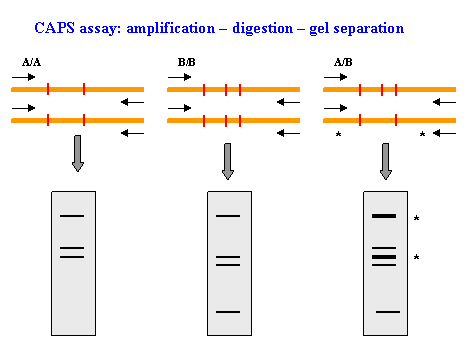 |
 |
||||||
   |
|
|
CAPS
|
Cleaved Amplified Polymorphic Sequences (CAPS)IntroductionCleaved Amplified Polymorphic Sequences (CAPS) polymorphisms are differences in restriction fragment lengths caused by SNPs or INDELs that create or abolish restriction endonuclease recognition sites in PCR amplicons produced by locus-specific oligonucleotide primers. How It Works The CAPS assay uses amplified DNA fragments that are digested with a restriction endonuclease to display RFLP.
Advantages
Developing CAPS markers
ProbeSample Queries
References» Konieczny A, Ausubel FM. A procedure for mapping Arabidopsis mutations using co-dominant ecotype-specific PCR-based markers. Plant J. 1993 Aug;4(2):403-10. PMID: 8106085 ResourcesPubMed query: Note: [MAJR] is a Medical Subject Heading (MeSH) tag for Major Heading. The tag is used to limit the search to articles for which major subjects are represented by terms included in the NLM MeSH database. DisclaimerMention of specific products or vendors on this website does not constitute an endorsement by the U.S. government. |
Questions or Comments?
E-mail the NCBI Service Desk
